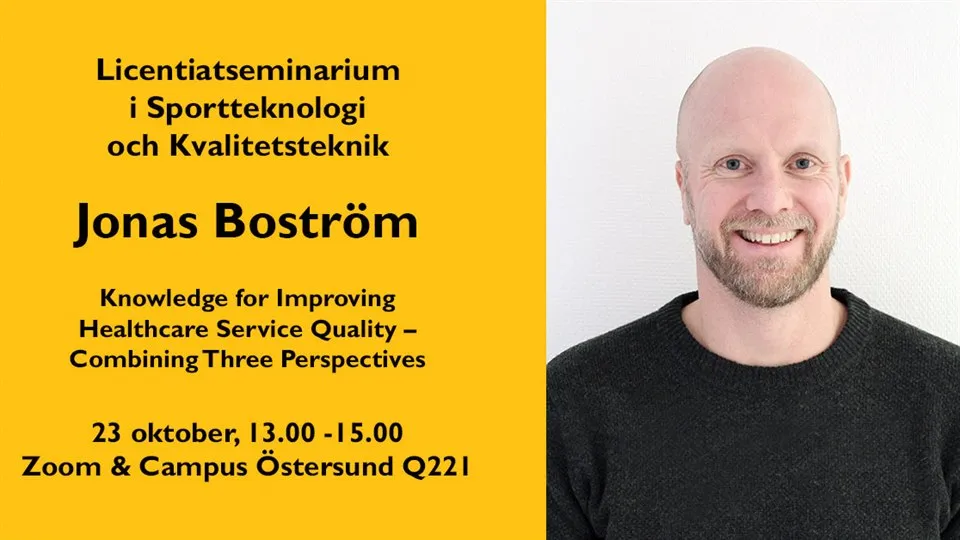Licentiatseminarium i kvalitetsteknik med Jonas Boström
Varmt välkommen till licentiatseminarium i kvalitetsteknik med Jonas Boström som ska försvara sin avhandling: Knowledge for Improving Healthcare Service Quality – Combining Three Perspectives. Observera att du behöver anmäla dig för att delta vid seminariet!
Vill du närvara vid seminariet?
Länken till den digitala plattformen Zoom kommer i ett bekräftelsemejl när du har anmält dig. Vi har ett begränsat antal platser på campus Östersund, sal Q 221.
23 oktober kl.13.00-15.00
Avdelning: Institutionen för kvalitets- och maskinteknik (KMT)
Huvudhandledare: Johan Lilja
Handledare: Ingela Bäckström, Helene Hillborg
Opponent:
Andreas Hellström, Senior Lecturer, Technology Management and Economics at Chalmers, Gothenburg
Sammanfattning
Avhandlingen berör olika kunskapsområden som kan tillämpas för arbete med kvalitetsutveckling och innovation i hälso- och sjukvården. Hälso- och sjukvården står inför såväl nutida som framtida utmaningar kopplat till de tjänster som den erbjuder medborgarna. Detta rör framförallt arbetet med de tjänster som är komplexa med många aktörer och problem som inte passar sig att lösas med traditionella metoder och verktyg som bygger på linjära samband. Avhandlingen studerar därför perspektiv som kombinerar professionens förmåga att utveckla behandling, förbättringskunskapens förmåga att förbättra processer och designs förmåga att synliggöra användarnas behov.
Abstract
The Swedish public sector in general, and healthcare specifically, is struggling with large deficits: 19 of 21 regions have large negative results in 2019. The demands made by the citizens and their elected politicians that healthcare should offer effective, accessible, good and equal care are difficult to meet. However, when it comes to emergency care, Swedish healthcare scores high on international rankings. The difficulties and challenges today lie in ensuring good and equal care for the large groups of people with multiple illnesses, and patients who need long-term care from different healthcare providers. A complicated system has become even more complex.
Organizational research has shown conflicts between different ways of working to improve and change the organization and the methods that support the daily work of providing healthcare services. Furthermore, quality research shows that there are knowledge gaps to be filled when it comes to understanding how complex problems should be handled and what kind of knowledge could contribute. This also applies to the tensions and conflicts that can arise when knowledge from patients, other professions and fields of knowledge must be integrated with the knowledge that the professions (physicians, nursing) possess. Several public organizations have in the recent years also adopted methods, tools and approaches from the design field. Especially user involvement (human-centric), collaboration and visualization. Design research often highlights the methods to be favorable for handling complexity.
The overall purpose of this thesis was therefore to gain a deeper understanding of how the quality development work in healthcare is expressed and how it is affected when different perspectives of knowledge are integrated - with a focus on improvement knowledge, professional knowledge and design thinking.
Since the purpose of the licentiate thesis was to gain a deeper understanding of what happens when new knowledge to develop quality in healthcare emerges, the method is based on a qualitative approach. Three research questions were formulated and led to three studies. The first study, a literature review showed that there is limited research in the area but that there are indications that user involvement in development work affects employees' attitudes and values. In study number two, a case study was set up using design methods and involving users. The results showed tensions between the improvement work and the daily clinical operations. This tension could primarily be attributed to the conflict between faster and slower processes (doing and thinking), when moving between different practicing skills (design, improvement and professional). The last study aimed to understand more about the management's view of this, in healthcare, relatively new knowledge (design) in relation to the traditional way to work with improvement and change. The result stresses that there are potential conflicts between the different fields of knowledge. But the interviews were also interpreted as showing the synergy effects that can arise when different practitioners meet, and the results also show that different ways of thinking can challenge the traditional ways of handling improvement and change in the development of healthcare.
The thesis result strengthens the research that shows that design can add another dimension to traditional improvement work in healthcare. However, there is also frustration about something which is perceived as more abstract and reflective and which can sometimes be slower than what the solutions-oriented professions, who work under great time pressure and with scarce resources, are used to. Furthermore, the thesis highlights the problem that also has been described in previous research and which signals the (in)ability to both share new knowledge and to absorb it.
